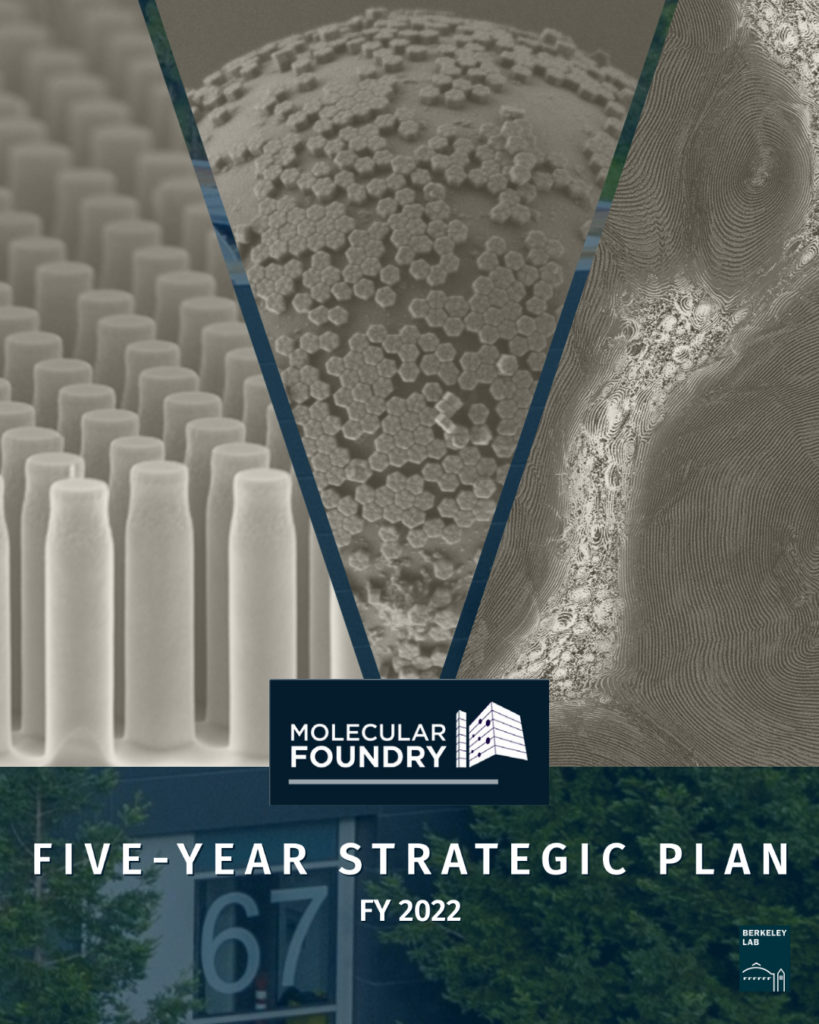As mentioned recently, the Foundry has been working through a process to create a new 5-year strategic plan. As a DOE User Facility, it is critical that our planning process reflects the needs of the various scientific communities that we serve.
Beginning with listening sessions back in the spring and culminating with the draft posted for public comment in September, we developed a set of five research themes at the forefront of nanoscale science that integrate users, staff, and techniques across all seven technical facilities, and embody the Foundry’s core capabilities and synergistic activities in synthesis, characterization, fabrication, and theory. These themes summarized below, as well as the strategic plan as a whole, will be reviewed annually to evaluate their novelty, relevance, productivity, and impact.
The document reflects the collaborative contributions of the Molecular Foundry’s leadership and scientific and technical staff, and relied on the efforts of the each theme’s leads (named within) and the Foundry’s facility directors to bring those contributions together. We would also like to thank the members of the Foundry’s scientific advisory board, user executive committee, and proposal review boards, as well as stakeholders from Berkeley Lab, UC Berkeley, our fellow NSRCs, and the broader user community who all were critical in the development of this plan.
Download the Molecular Foundry Strategic Plan
Architecting Information-Dense Multi-scale Materials
This theme aims to build information-dense, multi-scale materials that achieve rich functionality by controlling the energy landscape and energy flow across multiple time and length scales. Areas of focus include the development of new capabilities for understanding properties such as transport of charge, mass, and spin; dissipative response to external stimuli; and localization of sequential and parallel chemical and mechanical reactions that are made possible by multi-scale matter.
Atomically Precise Control of Energy and Information Flow
This theme focuses on the design of function through manipulation of physical and chemical properties of nanomaterials and understanding of fundamental principles governing the emergence of function from structure. It leverages the Foundry’s expertise in precise fabrication, synthesis, and assembly, guided by the application of advanced theory, multimodal and correlated nanoscale imaging, and detailed characterization of form and function.
Nanoscale Science Towards a Sustainable Future
Key elements of this theme are the science of electrification, biosynthesis, circularity, and separations. This theme is motivated by the role that basic science can have in addressing the constraints defined by limited resources and the negative impacts borne by an increasingly interconnected society.
Accelerated Materials Discovery and Prediction
This theme aims to develop capabilities to accelerate materials discovery via automation and machine learning, replacing the traditional trial-and-error approach with synthesis by design and co-design of experiments and analysis. This will be accomplished through a systematic combination of high-throughput synthesis, characterization, theory, and machine learning.
Physical and Digital Infrastructure as Drivers for Innovation
This theme focuses on the Foundry’s leadership in the implementation of strategic investments in world-class physical and digital infrastructure that enables high-impact research and is an innovation multiplier though our user program. Science at the Foundry is driven by synergistic activities in synthesis, characterization, fabrication, and theory, featuring a broad range of state-of-the-art, often one-of-a-kind instrumentation and capabilities whose impact is enhanced by combining their functionalities or defining integrated workflows.


